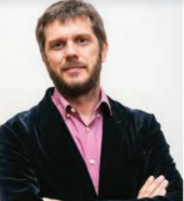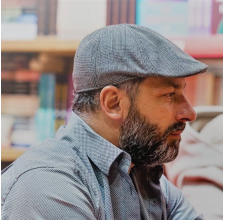 Ivan Krastev is the chairman of the Centre for Liberal Strategies in Sofia and permanent fellow at the Institute for Human Sciences, IWM Vienna. He is a founding board member of the European Council on Foreign Relations, a member of the Board of Trustees of
Ivan Krastev is the chairman of the Centre for Liberal Strategies in Sofia and permanent fellow at the Institute for Human Sciences, IWM Vienna. He is a founding board member of the European Council on Foreign Relations, a member of the Board of Trustees of
The International Crisis Group and is a contributing opinion writer for the New
York Times. He is the 2018-19 Henry A. Kissinger Chair in Foreign Policy and
International Relations at the John W. Kluge Center, Library of Congress. Ivan Krastev is also member of the Ethical Board of “The Bridge”. His latest books in English are After Europe (UPenn Press, May 2017); Democracy Disrupted. The Global Politics on Protest (UPenn Press, May 2014); In Mistrust We Trust: Can Democracy Survive
When We Don’t Trust Our Leaders? (TED Books, 2013). Ivan Krastev is a co-author with Stephen Holmes of a forthcoming book The Light that Failed (Penguin, 2019) on perils of the politics of imitation.
 Jordi Vaquer is a Spanish political expert. He was graduated for political sciences at
Jordi Vaquer is a Spanish political expert. He was graduated for political sciences at
the Autonomous University of Barcelona and later was awarded a doctorate for
international relations at the London School of Economics. From 2008 to 2012 has been director of the think tank Barcelona Centre of International Affairs. Presently he is director of the Global Foresight and Analysis at the Open Society Foundation, after having been director of the Open Society Initiative for Europe. Jordi Vaquer has been a contributor in
some of the most prestigious Spanish newspapers.
Jordi Vaquer: We are going to discuss the longer-term vision of the crisis, not the current event so much as the question of where it may be leading the world, and Europe in particular. To start the conversation, I would refer to an endless circle in Europe: we have been in a crisis for years now. Let us start to see why and how this is a different crisis and why and how it connects to the previous ones.
Ivan Krastev: Paradoxically I do believe that this crisis is also the second coming of the series of the previous crises. If we see the outcomes, if we review some of the political outcomes, if we compare this with, for example, the responses to the terrorist attacks that swept some of the European countries in the 21st century, you are going to see that some of the emergency situations, and also the extraordinary measures taken by the governments now, are tantamount, in a much stronger version, to this type of responses that we had to the terrorist crisis. If we look at the financial crisis of 2008, 2009, 2010, all the economists will agree that this is the second coming of the economic crisis and that this one is going to be much more devastating than the previous one, according to the latest data that I have seen: the decline of the production and of the GDP in countries like Germany or France is going to be the worse in all post Second World War period. And, certainly, if we talk about the refugee crisis, we will basically see that the present crisis has closed much more borders than the refugee crisis did, particularly between the EU member states. So, from this point of view this became the culmination of a crisis decade which was facing the European Union with some basic questions of how it can function and what is the solidarity between the EU member states. But this time, all these three crises came in a package of one. It is much stronger. From this point of view, my claim is that if in the previous crises you can hope that, when it is over, the world can go back where it was. This time is much more difficult to expect that the solution of the crisis will be simply the restoration of a certain pre-crisis normality. Just to give you one argument why do I believe that this one will be much more transformative, for good or for bad, than the previous crises. This is a crisis that was not unpredictable. It is enough to read the reports of the American intelligence community from 2004 in order to see that the risk of a pandemic that is going to produce the total global disruption was very much predicted. It is enough to listen to Bill Gates TED talk of 2013, in which he is telling that what happened was going to happen. Nevertheless, it was predictable, but still unimaginable. For the climate change, we need some of the big polluters to be closed , and they have been closed. In addition, at the same time, for many of the Right Wing populists who had been talking that we should restore the borders between the EU Member States, that is, the freedom of movement should be over, even when they were saying it, they did never believe it, because we are so much used to this type of open borders world. Then suddenly now we live in a world in which the borders between the EU member states are closed. From this point of view, I expect a kind of invasion of radicalisms with different colours and from different directions in the public debate.
Jordi Vaquer: I think it is interesting that even those who were prepared for the crisis, for the first wave of the crisis, the pandemic, they cannot be sheltered from the second wave of the crisis, which is the massive economic downturn. If we look at Taiwan or Hong Kong or even Canada, which had a SARS outbreak in 2007, these countries were prepared for the pandemic. They did quite a good job. Still they were not sheltered from the global transformation, because the world is going to change, not just because of the pandemic, but around a pandemic, that had generated all this transformation. And I think that what you say about the continuity, it shows very clearly in the framings. So for example, today I saw some statistic about the German public opinion where 45% of the German public opinion thinks or agrees that the crisis, the extent of the crisis, is at least partly the fault of bad governance in Italy and Spain. And only 22% disagree. It probably that could not have been like this if the public were not completely prime to think about the quality of governance in Italy and Spain for the last fifteen years. And all of sudden something new happened. And, yes, in Spain and Italy probably it is in part due to governance, but probably also to the bad luck that the crisis arrived there before and they found themselves as the epicentres. It is interesting how the old frames from the previous crises are so strong and resilient that they are framing the interpretations of facts. I guess one of the questions is for how long we will be interpreting the crisis with the old frame of references, and when there will be new frames of references. A group I talk to often is the Activist for Digital Rights. Their initial reaction was: “This is terrible. We cannot have all this surveillance”. But when the evidence was coming from Asia that actually surveillance and apps and all these things had helped, they were shocked, and now they are really trying to see how could you create this space to do things differently for the use of technology. Because without technology it will be much harder to contain the situation. So one of the phenomena that I am seeing in this crisis, and I am worried about this, is not only the good old confirmation bias. Every one entered the crisis and, if for you the most important thing is the bad governance in Southern Europe, that is going to be the interpretation. If for you the most important thing is the gender equality, you’ll say this confirms all the things I’ve been saying about the care economy. And if for you is the climate change, than you can have the confirmation that you can do this thing. So, everybody has the confirmation bias. This is human. The problem is how early everyone starts to adjust to the paradigm of what is happening to a crisis that may look superficially like some things are the same as in the past, but actually it’s radically different, because this is of the first big crisis that hits the three big engines of the global economy at the same time. Sometimes it had happened that Europe has been in a bad shape, Asia has been in a bad shape, North America has been in a bad shape… but all of them at the same time? And all of them revealing deep problems in governance? This is new. And if we just interpret things in terms of “business as usual” or in terms of the world we knew, this is problematic. I think the one aspect you mentioned, and perhaps we could talk a bit more about it, is the return of borders, but also the return of governments: people looking at governments. In some ways, I tend to the analogy with old epidemics, when people turned to the Church, even when it was obvious that the Church did not have the solution. Now people are turning to the government, even when it is obvious that the government does not have the solution or the tools. In this way, with people turning to government and the government having in fact to admit that it is to a certain extent powerless, this is something important. But on the other hand it is an opening for a different relationship between the state and the economy, and the state and the individual. I would like to see whether this is will be a permanent feature or only part of the emergency. How do you see this, Ivan?
Ivan Krastev: First, I find very important what you said that this time the confirmation bias could be our worst guidance in this crisis. Normally people with strong ideological beliefs look at every crisis as an opportunity, as the famous saying: “no crisis should be wasted”. When you say this, you are not interested in the crisis. You are just interested in the crisis as an instrument to promote the agenda that you had before the crisis. I think that there is sociologically a major different between this crisis and the previous crises, for example the refugee crisis, or the economic crisis. Sociologically, I do believe that the previous crises were very much based on anxiety. Of course, we fear certain things but we fear certain things because we feel intellectually dislocated. We do not understand how the world is functioning. Certain expectations about the world, of the globalized world, have collapsed. And the result is that the people become very anxious. Now, this crisis is not rooted in anxiety. This crisis is rooted in fear. You know what you fear. You fear being infected. You fear that, if you go to the hospital, there will not be a bad for you. It is a fear that you can die. This is existentially much more important because we are confronted with our own mortality. All modern culture in the West during the last decades was trying to make us believe that this is not something not nature. Even when an old person is dying, normally we are going to ask whether there was a doctor’s mistake or was it an accident. It was so difficult for us to live with the idea that being mortal is at the heart of the human existence. Now we are confronted with this. And this basically is getting us out of our comfort zone, existentially and not simply politically or economically. From this point of view, it is very different, but also this crisis repeats some of the previous crisis. If you see the policy responses, you will see that they are very different. Germany made its biggest spending in its post Second World War history. The way they responded this crisis is very different to the way they responded to the financial crisis of 2008-2009. This is an interesting story about this crisis. Our political imagination is very much shaped and framed by the XX century. We are very much used to think in terms of wars or revolutions. But if you see the history of borders, you are going to see that the borders were extremely important institutions exactly when it comes to containing infections and epidemic. It was in the year 1711 when the Habsburg monarchy decided to create a very well protected border with the Ottoman Empire, from where many of these infections were coming. Moreover, they had quarantine for everybody entering for two weeks. It is not much different of what we are seeing today. It was 18th century. Because of it, I do believe that the initial reaction to this crisis was natural confinement and going back to the borders. I am calling it a “state home nationalism”. It is very different from ethnic nationalism, which was triggered by the refugee crisis. This is not about Bulgarians against the world or Hungarians against the world. Paradoxically for the governments this nationalism is much more territorial. The governments made it clear that they had to take care for everybody who is in the territory of the country, because you cannot simply separate people. The interesting story with this infection is that this is actually a quite egalitarian one. This is not like cholera or other types of infections that go to a certain part of the population, normally to the poor part of the population. Here everybody, including Boris Johnson, can be infected. So the result is that you should take care of everybody who is in your territory. For example, concerning the Bulgarians that decided to stay in Spain for the crisis, the Spanish government should take care of them. This is very clear and very important. This nationalism is strong but it is different. But this is only the first part of the crisis. The second part of the crisis is when it becomes much more economic. It is going to be that this natural attachment to the borders will backfire, because most of these countries are very much export oriented. They are part of a bigger European and global supply chain. So they are going to understand that, if you are going to open your economy, but you keep your borders closed, you are dead. And at this point, when it comes to these two main issues, we still don’t know who is going to benefit from this crisis, whether the state nationalism or the populism. Populism benefited very much from the situation of anxiety, but what we see today is that, out of the fear that came with this crisis, it was the governments that benefited most. No matter who was on the government, because people wanted to trust the government. Normally they do not trust the government. It is exactly with the example of the religion. And nationalism was the first intuitive reaction. I do not know how is going to look when people will realise it is not easily for them to move.
Jordi Vaquer: You said that this is an egalitarian epidemic. It is and it is not. I was reading about the colonial treatment of epidemics. In the colonial time, there were epidemics in a number of countries, Kenya, India, etc. The preoccupation of the governments was that Europeans should not be affected. And the economy should not stop. In a way, Europeans are now “bringing” the disease. It is the rich who are mobile, who travel for business, tourism, cruise ships. Those are the ones bringing the diseases to different places. But what happens in a place like India or a place like Africa is very different. First of all because they react by copying the solutions of the developed nations. But of course, in a place where 80% of the economy is informal, this is totally nonsense. Everybody is told to stay at home, which means starving and which means that these people live in another planet. So these are measures that are from another planet. They are for treating this infection disease, but India has tuberculosis more than any other country in the world. Africa also has high tuberculosis rate. All of a sudden, people say: “Why this disease, which is not more infective than other diseases that are killing us, is affecting our government so differently?” It is interesting because the fact that the epidemic touches the elite does not bring the elite closer to the people. Sometime in some countries, it brings them further away, because people say: “Well, we were already dying because of the infective diseases. Why it is different that I now just cannot go and make a living. Now I would like to go back to your idea of the renationalisation of the economy. I think it is going perhaps to last … not the renationalisation, because in this I agree completely with you: It is impossible to go back to the old economic model. But I think some renationalisation is already going on. There is in America in particular a very strong pressure to stop depending on China. It is Ok to depend on the Check Republic, but maybe not to depend on India or China, for a number of strategic reasons, and also from the practical point of view. I think that some de-globalization is going to happen, which may not take the form of pure national borders, but perhaps somewhere in between. That looks to me as a possible outcome. In addition, it will connect with the idea of less mobility, and less flying of people and things around the world in big amounts. But let me go back to your comment on populism. It is interesting to observe that this time the national populist in many places are in government. You are saying they thrive on anxiety, but they also thrive on the confrontation. They thrive on just making noise while not taking responsibility. Here it is Modi in India, here it is Bolsonaro in Brazil, here it is Trump in America, and they will try to deflect the blame, of course, and blame everyone else. We are saying now Trump talking about the World Health, and about China and everyone. Ultimately, it is not going to be as easily as it was at 2008, to just blame the statu quo, Washington establishment, Brussels elites. Because first of all the biggest decisions are taken at the national level. There is this rallying around the flag in every country whoever is in government: the left, the right, populists, centrists… That makes no difference. But they also know that this effect will not last, it is a temporary effect. In the long run these governments will be judges by their performance. Now citizens sitting at their home are comparing two things. One: is the authoritarian governance more effective or less effective? And the other thing they are comparing is the following: “Is this populism more effective than the old style expert led centrist politics? People may think that an authoritarian government is better for the control of the epidemic, but it is a disaster for the recovery of the economy. Or they may say: “These populist charlatans at the beginning seemed useless, but at least they got the economy back on its feet”. I am too cautious to make too early assumptions about who will be the winner.
Ivan Krastev: It is very difficult to try to talk about the post-war situation when the war it is not over and when you don’t know who is winning. However, already there are two or three things that at this stage I believe we can see. One is the distinction between the democratic government and the authoritarian government. On the base of response to this crisis, it is not easy to be made. Governments of very different political regimes are adopting very similar policies. If you see who is doing best in dealing with the crisis, you are going to see that democratic countries like South Korea are doing this as efficiently as some country like Singapore, which has an authoritarian regime. There is an American scholar who tries to figure out how democracy and authoritarian are opposite worlds, and we can see that the nature of the political regime is not a critical factor. It does not define neither the efficiently of response neither the measures of the response. We like to talk about surveillance, which is typical for China, but now the level of using this type of apps in surveillance is also very much typical for a democratic country like Israel. So, from this point of view, this is the worst moment to try to claim that the outcome of the crisis will be the victory of a political system. On the other hand, China could have a problem. President Trump is trying to blame them for everything that is coming, but today the Washington Post had an interesting report based on Chinese journalists, showing quite clearly that China was hiding for quite a long time the spread of the disease, basically the data about the number the people that have died. Probably this also affected the response of the other counties. The second question that you asked is very interesting. Why such different countries, with such different demographics, and with so different economies, are reacting in such similar ways? Why everybody is going with the social distancing, with the lockdowns? I do believe that an interesting way to answer this question is to go for an important distinction that the American economist Frank Knight made already back on 1921, just the day after the Spanish flu. He said that there is a major difference between taking decision in a state of immeasurable uncertainty, in which you know nothing, you have no data, you don’t know how it is spreading, and the usual risks, with which governments and companies deal every day. In the moment of immeasurable uncertainty, you are work with the worst-case scenario, and you have good reasons to do what the others are doing, not because they are doing it right, but because you don’t want to be accused the next day, that you didn’t do what you should have done. So, from this point of view, there was very much self-protection of the governments when they decided to do what other governments were doing, in spite of the fact that the situation in their countries was very different. I don’t know whether it will start to change when the governments will have more data about what is happening in their societies, or when there will be political resistance coming from the population. For the moment, according to the American colleague that I was quoting, there are three factors that best describe the efficiency of the response to the coronavirus. First are the lessons learned from previous epidemics. It is not by accident that countries like Korea or Singapore, Taiwan or Canada, that have their SARS experience, they were more prepared, they made tests immediately and they were much more decisive than anybody else: they had learned how to do it. The second is the level of the social trust. This is a very important point that the colleague is making. She said that you cannot keep people at home simply by repression. People should trust their government to stay home. From this point of view, you have a kind of high social trust in regimes like the Chinese or the German. Two very different political systems, but according to the surveys, in both these countries people had high trust in the governments. They are doing what they are told to do. On the other side, there are countries where the social trust to the government is quite low, and this explains probably why in places like Bergamo many people decided that what government was saying should not be taken seriously. The third is the efficient of the bureaucracy. You made a very good point that Germans were saying that there is the bad governance in countries like Spain or Italy. This crisis is going to end up with two types of countries. Ones who become very self-confident and proud of the efficiency of their governments. Germany is very much about this. Because they had many infections, but very low level of people dying, they have the feeling that they are doing well. Then you have countries that are not necessarily the most difficult ones, like for example Spain or Italy, but even in countries like Rumania 40 % of the all the infected people are medical workers. So you have a failure of the government to protect the people on the front line. I do believe that, if there is a dictatorship that is functioning today, it is the dictatorship of comparisons. Every night, everybody is not just watching what happens in their own country, they are watching what is happening in the US, what is happening in Spain, what is happening in Italy, how the Swedish experiment is going to do. So paradoxically, in our understanding of the world we are much more globalised than we have been before. Strangely enough, this kind of the crisis brought everybody home, but made cosmopolitans out of everybody staying home.
Jordi Vaquer: I think this tyranny of comparison works also in unexpected ways. You were mentioning the difference between South Korea, being more democratic, and Singapore, being less democratic, let’s say. At the same time, the use of apps in Singapore is much more consented by people. And in South Korea there has been much more invasion of privacy. What we are seeing is that the practises are very different from what the government is saying. After all, the approach in Europe is much more oppressive, by forbidding everyone to go to the street, than the approach in Singapore, or in other countries that we see as more authoritarian. It may also make us re-examine the limits of whom we see as more democratic or less democratic, more open or less open, if we are ready to interrogate our assumptions. As we were saying before, this has been a moment where everyone was looking for confirmation and for the reaffirmation of his or her ideology. We will now see how it changes… Perhaps just a last sentence about the European Union and the new tensions. Do you imagine that all these crises having converged to this one may lead to solve it by breaking some of the moulds and looking forwards? Or do you think it is a moment when we are coming closer to disintegration, or at least to become less integrated?
Ivan Krastev: I don’t know in which direction it will go. The only thing my intuition tells me is that after every of the previous crises we could hope that we could simply manage it. We believed that without making radical changes, we could keep the European Union as it was. And what I do believe that what makes this crisis different is that either we are going to move in a way much more radical towards “less Europe” or “more Europe”, but we are not going to preserve the European Union simply preserving the polices that we see today.
Jordi Vaquer: I agree, and I think there is one test case, which is economic, another test case is the borders, and the third test case is Hungary, whether the new authoritarian experiment will consolidates, or Hungary has to go back not just to normality in terms of pandemics, but also in terms of European norms and values.
(From the Centre of Contemporary Culture of Barcelona)







